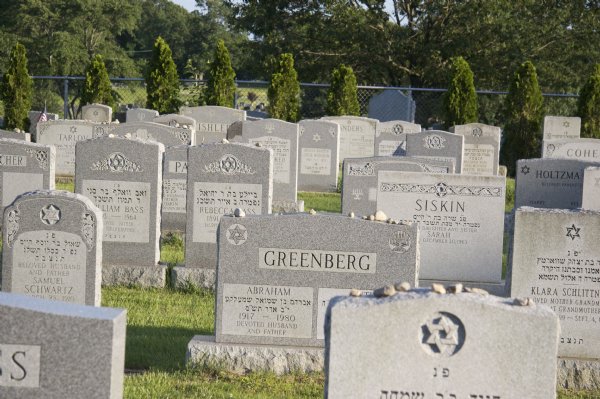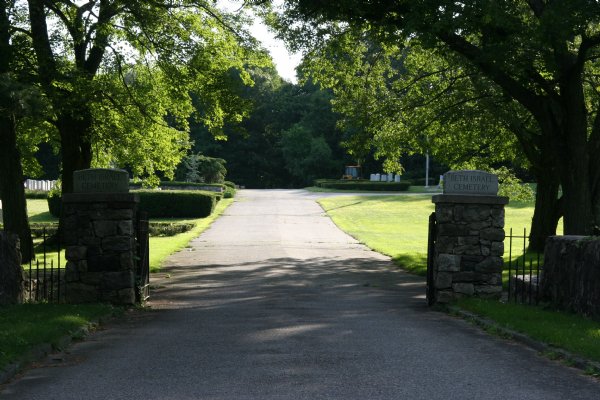Beth Israel Cemetery 227 Richards Avenue, Norwalk, CT 06850
The time of a person’s passing is the culminating moment of his or her mission in life….
Beth Israel ( Hebrew Bet Israel Society) Cemetery has been serving the Jewish community in Connecticut since 1950. Since its inception, Beth Israel has provided a place of respect for your loved ones and a place of solace for your family.
Each area is a distinctive achievement of grace, dignity and tradition. The park-like grounds are amply planted with trees and shrubs to enhance the natural appearance of private plots. Plots are easily reached by visitors .
Beth Israel Chabad is committed to compassionately serving families during their time of need dignity and sanctity. We will provide members of a Chevra Kadisha – Jewish burial society who prepare the deceased for interment by performing the traditional purification known as Taharah. Doing acts of kindness for someone who has just died is done with the knowledge that that kindness cannot be repaid by the deceased, and thus, has long been regarded as the ultimate act of selflessness. This time-honored tradition is performed for men by men and for women by women. Ecclesiastes states: “As he came so shall he go”. Just as a newborn child enters this world clean and pure, so shall a person who departs this world leave, cleansed and pure.
Two overriding principles govern the Jewish approach to death and mourning. First, Kavod Ha-Met -honoring the dead. It is of the utmost importance to treat the body with respect and care from the time of death until the burial is completed. Second is the view that death is a Natural Process: Death is considered a natural part of the life cycle, and the body must be returned to the earth whence it came. Hence, everything associated with the body must remain, facilitating its proper return. Jewish law and tradition have endowed the funeral with profound religious significance.
Scheduling the Funeral
It is a Biblical commandment to bury one’s deceased immediately after passing (taking legal and logistical considerations into account).
Burial
Jewish tradition has maintained that burial should be in the earth.
Cremation, Embalming and Autopsies
Cremation is forbbiden according to Jewish Law. Embalming is not a traditional Jewish practice. Autopsies should be avoided as they violate the principle of kevod ha-met – respect for the body of the deceased.
Taharah
When a person departs this world, he or she is washed and purified by a person with special training to perform the Taharah – the sacred rites of washing and purification, which is accompanied by prayer and appropriate Psalms. In most cases following Taharah the deceased is dressed in shrouds.
Shemirah
In traditional Jewish law it states no deceased should be left alone. A shomer (watcher) reads Psalms and prayers on behalf of the deceased.
Casket Choice
Typically Jewish caskets are made of solid wood. Jewish funerals avoid showing vanity and pride thus choosing a simple wooden casket.
Viewing of the Deceased
Unless for identification purposes, public viewing the deceased is considered to be disrespectful and should be avoided.
Donations and Sympathy Gifts
It is believed that greater honor is paid by making a charitable donation as opposed to displaying flowers for the deceased.
K’riah
According to the Torah, one of the essential elements of mourning is the performance of the K’riah (the rending of the outer garments) by first-degree mourning relatives. This symbolizes the tearing of the heart mourners feel at this time. When mourning a parent, one tears on the left side. For all others, one tears on the right side.
The Burial (“Kevurah”)
The body is returned to the earth, this is considered the final act of kindness. It is considered a great mitzvah to physically participate in placing the earth on the casket for the burial.
Meal of Consolation (Seudat Havra’ah)
Upon returning from the funeral to the home where Shiva will be observed, it is a ritual to wash one’s hands with water from a pitcher placed outside the door. The washing is performed with a cup of water poured alternatively on both hands and the cup should not be passed directly from hand to hand. After the washing, a meal is provided by friends, neighbors, or a synagogue committee. The meal generally includes foods that are round to symbolize the cyclical and continuous nature of life. Most commonly, hard-boiled eggs (which symbolize the close connection between life and death), lentils, garbanzo beans, and even bagels.
Shiva
In the wake of the death of a close family member, a traditional mourning period known as a shiva is observed. Shiva means “seven”, corresponding to the number of days after the funeral for which this official period lasts. The mourners generally stay at home and receive guests to help them pray and reflect upon their loss. A shiva candle is lit when the mourners arrive home from the burial and typically burns the entire shiva period. A rabbi should be consulted regarding the details of shiva practices.
Travel Directions
From North or South Via I95 (Connecticut Turnpike)
- Exit at 13 Norwalk Route 1, Post Road
- First right onto Connecticut Avenue (also known as
- Route 1 and Post Road)
- Turn left at third light onto Richards Avenue
- Go past Norwalk Community Technical College
- Enter on left Hebrew Beth Israel Cemetery
From Route 15 (Merritt Parkway) Northbound
- Exit 38
- Turn right
- First left onto Nursery Road
- Left on Ponus Road
- At fork, bear right onto Fox Run
- Left onto Richards Avenue
- Hebrew Beth Israel Cemetery is just past the school on the right

To purchase a family or individual plot please call the cemetery office at 203-866-0534 or email us for information: info@bethisraelchabad.org


